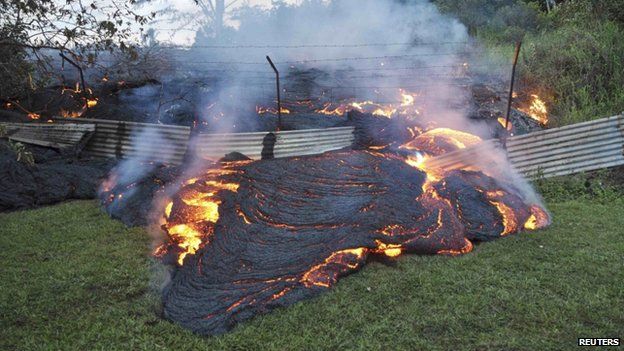Hawaiian village evacuates as Kilauea lava threatens
- Published

Residents of a Hawaiian village threatened by the Kilauea volcano have been evacuated from their homes as lava has hit the first houses in its way.
The slow moving, red hot lava spilling from the volcano is hot enough to incinerate homes and cannot be stopped by firefighters.
It has been flowing towards the village of Pahoa for weeks, destroying everything in its path, officials say.
Experts say the molten lava is hotter than 900C (1,600F).
"People have their life savings in their properties here. They face losing it all," businessman Mike Metcalf told the Reuters news agency.
A family prepares
Denise Lagrimas is packing up her family's home in preparation for the oncoming lava flow.
"I don't want to stick around and just wait for it to come and take it," she said. "You just never know."
Though it remains unclear if the home will be in the lava's path, the Lagrimas family decided to move to a nearby town.
They have also expressed concern the lava will block roads and prevent them from reaching their jobs in a coastal town to the north.
"We didn't want to go anywhere where it's close enough where we would have to evacuate again," Ms Lagrimas said.
Kilauea on the Big Island has been erupting since 1983, but lava has recently burst forth from a new vent.
Two roads to Pahoa have been closed and a cemetery has already been overtaken by the lava.
The town's residents will be allowed to watch the destruction of their homes "as a means of closure", officials said.
And they will be allowed to take photos and video for insurance purposes.
"You can only imagine the frustration as well as... despair they're going through," said Hawaii County Civil Defense Director Darryl Oliveira.
Can you stop lava?
At temperatures of about 1,000C, lava destroys whatever it touches. Its path is notoriously hard to predict.
The ability to impede or redirect lava largely depends on location, resources and luck.
Decades ago in Hawaii, the US attempted to bomb a lava flow, only to see the bomb craters refill. In Iceland, crews made use of billions of gallons of cold water around a nearby harbour to cool the lava in place. And barriers along Mount Etna in Italy redirected a flow away from a tourist area. But these attempts have been helped by a natural slowing or halting of lava eruptions.
"You have to be in a wealthy country with a lot at stake to even consider" lava diversion, Dr Shannon Nawotniak told the BBC, particularly given the volume of volcanic eruptions and the potential costs.
"You might buy yourself some time until the volcano stops itself."
The flow, now 55m wide, advanced about 275m between Sunday morning and Monday morning.
It has been moving at an average of five to 10m an hour, but has done so fitfully, sometimes slowing down to two yards or speeding up to 20, depending on topography, said Janet Babb, a spokeswoman for the Hawaiian Volcano Observatory.
Decomposed vegetation in the lava's path has also produced methane explosions at the front of the flow, Ms Babb said.
"It's not a massive explosion," she said. "But it can dislodge rocks."
After the new vent opened in July, lava threatened a separate community before coming to a standstill in September.
Mileka Lincoln a reporter in Hawaii says the lava is burning at upwards of 1,000C (2,000F)
- Published4 September 2014